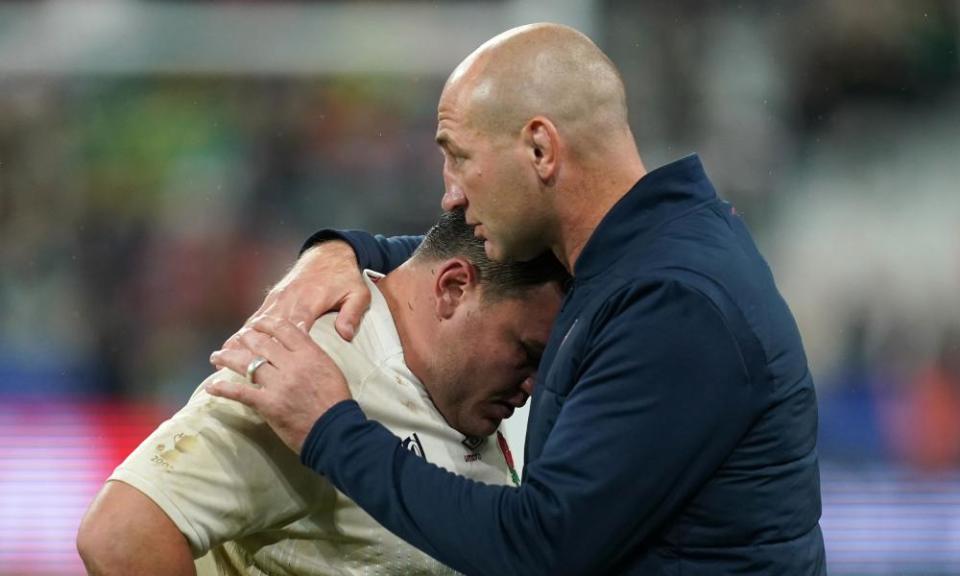Dominant England played the game of their lives. And South Africa still won

There’s about an hour on the clock at the Stade de France, and the World Cup semi-final has gone missing. I mean this quite literally. The World Cup semi-final between England and South Africa is, simply put, not there. What the 80,000 people in the stadium are staring at in the meantime through the sheeting rain is not immediately clear. A mass of amorphous wet shapes. Lots of big men scrabbling around on the ground and then very slowly standing up again. Medics and support staff trotting on to the pitch and then trotting off. Lots of talking. Lots of substitutions.
The ball itself hasn’t been seen since about the 35th minute. This is sport as a kind of dark matter, an anti-spectacle, a curious ontological experiment into whether a game of rugby can exist if no actual rugby is being played.
Related: England 15-16 South Africa: Rugby World Cup semi-final player ratings
If this is a practical joke on the part of Steve Borthwick and his England team, then it’s an excellent one. And perhaps the logical end point of what they’ve been trying to do for the last few weeks: a game that has been stripped back, and stripped back some more, until it physically disappears. This may well have been the first World Cup game with a negative ball‑in‑play time.
South Africa came prepared for a conventional brawl, but it’s very hard to exert pressure on something that isn’t there. Even the referee, Ben O’Keeffe, seems to have been swept into the vortex, and has essentially started running the game on vibes and twitches. And all the while, the clock is ticking.
Strange things have been happening all night. England have been hoisting high kicks and South Africa have had no firm answers. The blitzkrieg ballet of the France quarter-final a week ago feels like it belongs to a different age. Here the ball has been excruciatingly slow, the game scruffy and broken, the wall of white solid and unyielding. The Bok breakdown is being beasted. Siya Kolisi has quite literally had his pants pulled down in a maul. Bongi Mbonambi is having a waking nightmare at the lineout, but can’t be replaced because the bench is empty and in any case their reserve hooker is actually a flanker.
So, Rassie Erasmus, what’s the traffic light signal for “we’re screwed”? Certainly nobody could accuse South Africa’s director of rugby of sitting on his hands. The 10-man lineout has been tried and discarded. Manie Libbok has been hooked after half an hour and is now sitting disconsolately on the bench staring into space. The hapless Cobus Reinach and Damian Willemse have followed him off. A cooked Eben Etzebeth soon after that, and then a cooked Kolisi. And so pretty much the entire engine of this team has been ripped out and refitted, and still England are 15-6 up and for all the defibrillation and shock therapy the patient is barely quivering.
If the final in 2019 felt like an England team with too many plans against a South Africa team with one, then in many ways this game was the photographic opposite.
Here it was England who looked clear in their strategy, South Africa listlessly flicking through their inventory of tricks hoping to stumble upon something that worked.
And perhaps this was the inevitable comedown after the thrilling high of beating France: the immense difficulty of adapting to an entirely different kind of opponent serving up an entirely different kind of game. The final against New Zealand will be a different proposition again, but here they were forced to relearn one of rugby’s most elementary lessons: for all the frills and ruses, for all the posturing and mind games, big matches like this are won and lost on the fundamentals.
And so it was only by going back to the fundamentals that South Africa could recover their grip. Ox Nché came on to reinforce the scrum and started gaining traction against Kyle Sinckler, winning a couple of crucial pressure-relieving penalties.
With 11 minutes to go the immense RG Snyman, white shirts hanging off him like anvils, wriggled free and juggled the ball and managed to crash over for the only try of the game. Finally, a Freddie Steward knock-on produced another scrum, another ferocious shove, another coughed-up penalty. Handré Pollard, who had looked ordinary with ball in hand, produced the iciest of kicks. A strong scrum, clean carrying, excellence from the tee. This may not be the stuff of fly-on-the-wall documentaries or 4,000-word tactics blogs. But it’s still the only thing that provably works.
Download the Guardian app from the iOS App Store on iPhone or the Google Play store on Android by searching for 'The Guardian'.
If you already have the Guardian app, make sure you’re on the most recent version.
In the Guardian app, tap the Menu button at the bottom right, then go to Settings (the gear icon), then Notifications.
Turn on sport notifications.
The classic trope is that great teams find a way to win. The obvious response is that it doesn’t hurt being able to bring players of the calibre of Snyman and Nché, Faf de Klerk and Deon Fourie, off the bench. We can pick over the bones and ruins of this game, identify where it might have been won and lost, but really we would be peering into the mist, trying to see things that aren’t there.
England played the game of their lives. England came with the clearer plan and the better execution. England dominated long periods and looked mentally stronger. England made fewer errors and more turnovers. Meanwhile, South Africa won and will play the World Cup final on Saturday. On a night of twisted logic and thwarted patterns, that was perhaps the most fitting epitaph of all.

 Yahoo Sport
Yahoo Sport 






































